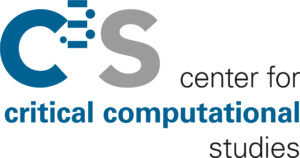Workshop ›Critical Theory of the Computational‹
The conference is organized in cooperation of the Weizenbaum Institute in Berlin, the Center for Critical Computational Studies (C3S) in Frankfurt, and the Center for Responsible AI Technologies (CReAITech), joining our expertise on interdisciplinary research on the impact of digitalisation and new technologies on individuals and society.
The workshop takes stock of a Critical Theory of the Computational. It engages critical theories (both in the tradition of the Frankfurt School and beyond) in order to examine how computational/digital constellations are shaping (upheaving, consolidating, etc.) foundational dynamics in society, and how said computational constellations are themselves embedded in ongoing planetary transformations (such as global heating). In interrogating possible preconceptions and assumptions entrenched in critical theories—such as human exceptionalism, and universalist aspirations—, we ask how these might be rethought in light of computational and planetary transformations.
During the 2-days workshop we will explore how computational constellations not only introduce new actors — such as AI systems and human–machine hybrids — but also shape existing understandings of agency and its properties like autonomy and emancipation. For example, the computational may give new opportunities for critical discourse, but it may equally give rise to numerous phenomena in politics and other parts of society that give cause for concern (such as power concentration, erosion of public discourse in liberal democracy, and enormous energy consumption).
By revisiting key concepts of critical theories—such as autonomy, emancipation, and social transformation—, the workshop will explore whether they require rearticulation or replacement to address the complex interplay of human, non-human, and planetary orders. Through cross-disciplinary dialogue, we invite participants to confront the assumptions that underpin both critical theories and contemporary discourses on computation. Together, we aim to develop a critical framework capable of addressing the multilayered and entangled realities of a computationally mediated world facing transformations of planetary scale.
The following three central questions will be discussed in the workshop:
- Why Critique—and How? How do we justify a critical stance on the computational amidst planetary stress—should our critique aim for constructive engagement, or does its force lie in unsettling entrenched norms? Which biases frame our standpoint, and how might a reflexive critique, attuned to social and planetary concerns alike, help shape more just futures?
- The Grand Challenges of Computational and Planetary Transformation: How does the computational reshape and challenge our understanding of the relationship of the human, non-human, inhumane, and no-longer human, and what ethical and political implications arise from these shifts?
- Future of Liberal Democracy: As computational networks and infrastructures become ever more embedded in polycrisis and planetary-scale change, how might liberal democracy be reimagined or reconfigured to remain legitimate, inclusive, and capable of addressing the complexities of a computationally mediated world?
Time and place:
16 — 17 October 2025, Weizenbaum-Institut, Hardenbergstr. 32, 10623 Berlin, Germany
Program:
16 October 2025
09:30–09:45 Registration with Coffee
09:45–10:00 Welcome (Christoph Neuberger)
10:30–12:30
Panel 1: Dialectics of the Digital: Critique, Co-Construction, and the Politics of Computation
Chair: Thorsten Thiel
David Berry
Daniel Martin Feige
Leonie Hunter
12:30–13:30 Lunch Break
13:30–15:30
Panel 2: Computational Capitalism and the Reimagining of Critical Reflexivity
Chair: Sebastian Berg
Florian Butollo
Anna Verena Nosthoff
Sebastian Sevignani
15:30–16:00 Coffee Break
16:00–18:00
Panel 3: Power and GenAI: Between Knowledge and Hallucination
Chair: Benjamin Rathgeber
Jan Batzner
Niklas Egberts
Ann-Kathrin Koster
Ben Potter
18:00–19:00 Networking with Catering
19:00–20:00
Keynote speech by Prof Kate Crawford (online) and discussion:
Model Collapse
The mass production and ingestion of synthetic data is destabilizing AI models, while the planetary resources needed to support this recursive cycle are growing dramatically. In this talk, Crawford will explore the relationships between algorithms, ecologies, and information that are driving toward forms of technical and ecological exhaustion.
17 October 2025
9:30–11:00
Panel 4: Grand Challenges and Planetary Transformation: Ecologies of Power in a Computational World
Chair: Juliane Engel
Katharina Block
Markus Maier or Raphael Ronge
Jan-Philipp Kruse
Angela Oels
Dan Verständig
11:00–11:15 Coffee Break
11:15–13:15
Panel 5: The Aesthetic, the Algorithmic, and the End(s) of Law: Critical Counterpoints to Computational Jurisprudence
Chair: Christoph Burchard
Barton Beebe
Katrin Becker
Jessica Eaglin
Sabine Müller-Mahl
13:15–13:45 Lunch Break
13:45–15:45
Panel 6: Future of liberal Democracy: Challenges and Opportunities
Chair: Christoph Neuberger
Frederik Heinz
Markus Patberg
Annette Zimmermann
15:45–16:00 Final Remarks


